2016新概念第一册 Lesson 91-92 课堂及课后练习
- 格式:doc
- 大小:214.38 KB
- 文档页数:3
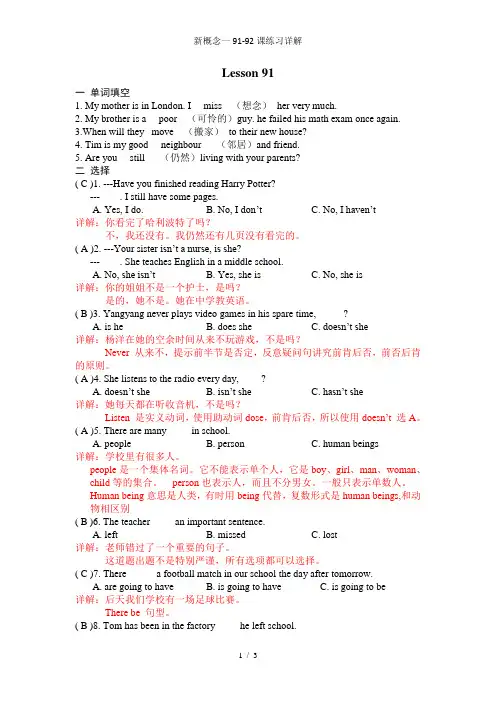
Lesson 91一单词填空1. My mother is in London. I __miss__(想念)her very much.2. My brother is a __poor__(可怜的)guy. he failed his math exam once again.3.When will they _move__(搬家)to their new house?4. Tim is my good __neighbour___(邻居)and friend.5. Are you __still__ (仍然)living with your parents?二选择( C )1. ---Have you finished reading Harry Potter?---____. I still have some pages.A. Yes, I do.B. No, I don’tC. No, I haven’t详解:你看完了哈利波特了吗?不,我还没有。
我仍然还有几页没有看完的。
( A )2. ---Your sis ter isn’t a nurse, is she?---____. She teaches English in a middle school.A. No, she isn’tB. Yes, she isC. No, she is详解:你的姐姐不是一个护士,是吗?是的,她不是。
她在中学教英语。
( B )3. Yangyang never plays video games in his spare time, _____?A. is heB. does sheC. doesn’t she详解:杨洋在她的空余时间从来不玩游戏,不是吗?Never 从来不,提示前半节是否定,反意疑问句讲究前肯后否,前否后肯的原则。
( A )4. She listens to the radio every day, ____?A. doesn’t sheB. isn’t sheC. hasn’t she详解:她每天都在听收音机,不是吗?Listen 是实义动词,使用助动词dose,前肯后否,所以使用doesn’t 选A。
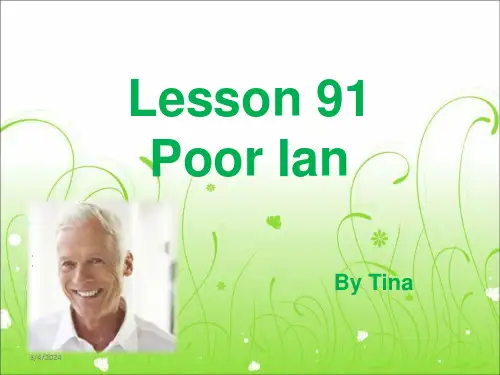
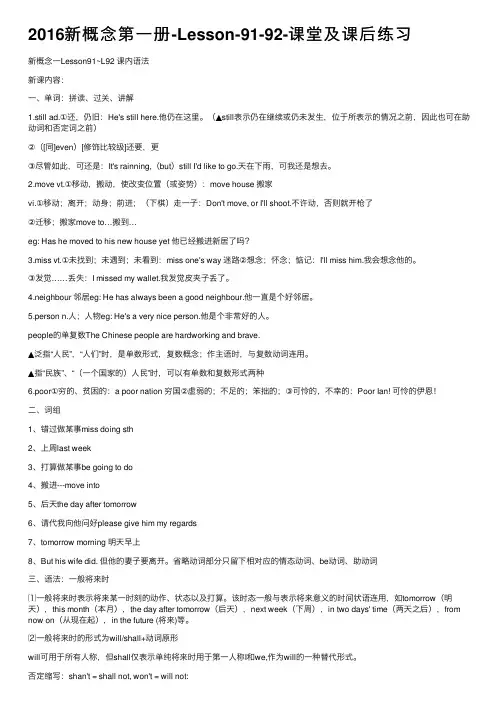
2016新概念第⼀册-Lesson-91-92-课堂及课后练习新概念⼀Lesson91~L92 课内语法新课内容:⼀、单词:拼读、过关、讲解1.still ad.①还,仍旧:He's still here.他仍在这⾥。
(▲still表⽰仍在继续或仍未发⽣,位于所表⽰的情况之前,因此也可在助动词和否定词之前)②([同]even)[修饰⽐较级]还要,更③尽管如此,可还是:It's rainning,(but)still I'd like to go.天在下⾬,可我还是想去。
2.move vt.①移动,搬动,使改变位置(或姿势):move house 搬家vi.①移动;离开;动⾝;前进;(下棋)⾛⼀⼦:Don't move, or I'll shoot.不许动,否则就开枪了②迁移;搬家move to…搬到…eg: Has he moved to his new house yet 他已经搬进新居了吗?3.miss vt.①未找到;未遇到;未看到:miss one's way 迷路②想念;怀念;惦记:I'll miss him.我会想念他的。
③发觉……丢失:I missed my wallet.我发觉⽪夹⼦丢了。
4.neighbour 邻居eg: He has always been a good neighbour.他⼀直是个好邻居。
5.person n.⼈;⼈物eg: He's a very nice person.他是个⾮常好的⼈。
people的单复数The Chinese people are hardworking and brave.▲泛指“⼈民”,“⼈们”时,是单数形式,复数概念;作主语时,与复数动词连⽤。
▲指“民族”、“(⼀个国家的)⼈民”时,可以有单数和复数形式两种6.poor①穷的、贫困的:a poor nation 穷国②虚弱的;不⾜的;笨拙的;③可怜的,不幸的:Poor Ian! 可怜的伊恩!⼆、词组1、错过做某事miss doing sth2、上周last week3、打算做某事be going to do4、搬进---move into5、后天the day after tomorrow6、请代我向他问好please give him my regards7、tomorrow morning 明天早上8、But his wife did. 但他的妻⼦要离开。
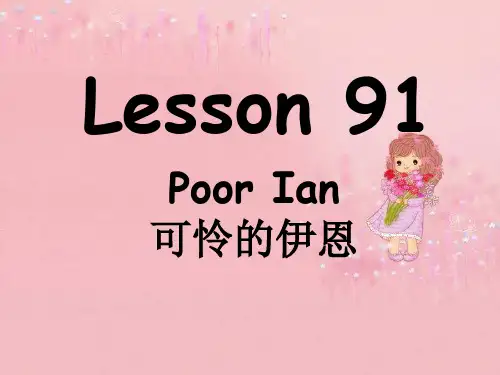
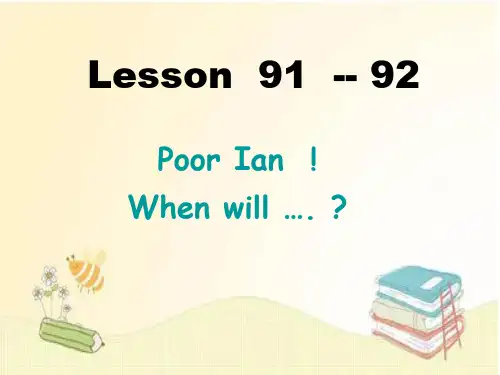
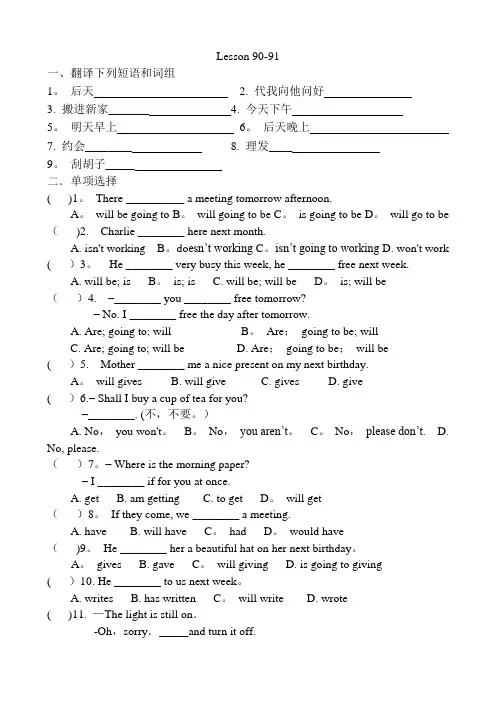
Lesson 90-91一、翻译下列短语和词组1。
后天 2. 代我向他问好3. 搬进新家_______4. 今天下午5。
明天早上6。
后天晚上7. 约会________ 8. 理发____9。
刮胡子_____二.单项选择( )1。
There __________ a meeting tomorrow afternoon.A。
will be going to B。
will going to be C。
is going to be D。
will go to be ()2. Charlie ________ here next month.A. isn't working B。
do esn’t working C。
isn’t going to working D. won't work ( )3。
He ________ very busy this week, he ________ free next week.A. will be; is B。
is; is C. will be; will be D。
is; will be()4. –________ you ________ free tomorrow?– No. I ________ free the day after tomorrow.A. Are; going to; will B。
Are;going to be; willC. Are; going to; will beD. Are;going to be;will be( )5. Mother ________ me a nice present on my next birthday.A。
will gives B. will give C. gives D. give( )6.– Shall I buy a cup of tea for you?–________. (不,不要。
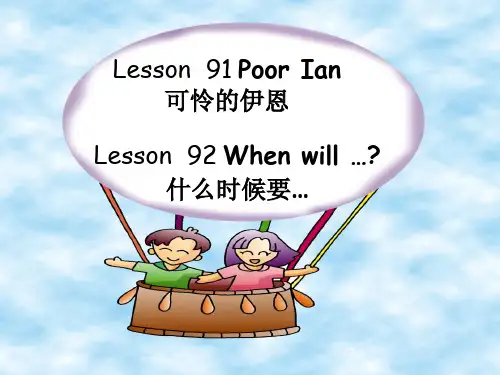
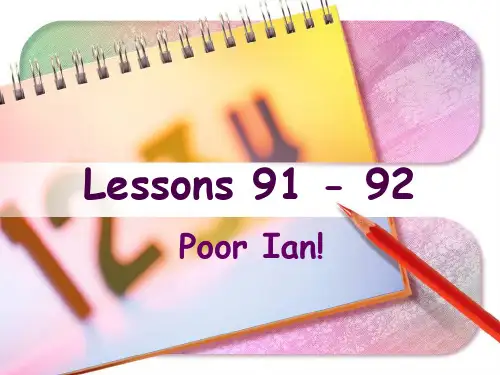
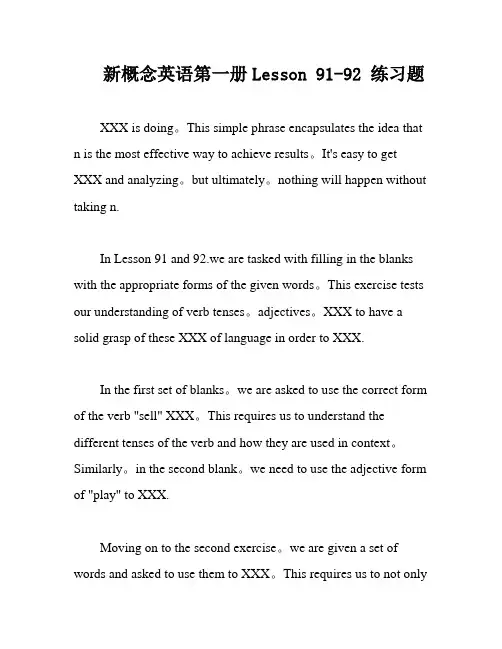
新概念英语第一册Lesson 91-92 练习题XXX is doing。
This simple phrase encapsulates the idea that n is the most effective way to achieve results。
It's easy to get XXX and analyzing。
but ultimately。
nothing will happen without taking n.In Lesson 91 and 92.we are tasked with filling in the blanks with the appropriate forms of the given words。
This exercise tests our understanding of verb tenses。
adjectives。
XXX to have a solid grasp of these XXX of language in order to XXX.In the first set of blanks。
we are asked to use the correct form of the verb "sell" XXX。
This requires us to understand the different tenses of the verb and how they are used in context。
Similarly。
in the second blank。
we need to use the adjective form of "play" to XXX.Moving on to the second exercise。
we are given a set of words and asked to use them to XXX。
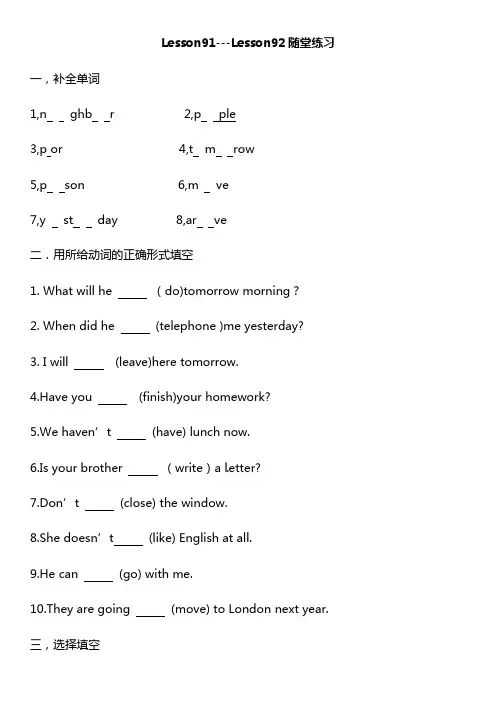
Lesson91---Lesson92随堂练习一,补全单词1,n ghb r 2,p ple3,p or 4,t m row5,p son 6,m ve7,y st day 8,ar ve二.用所给动词的正确形式填空1. What will he (do)tomorrow morning?2. When did he (telephone )me yesterday?3. I will (leave)here tomorrow.4.Have you (finish)your homework?5.We haven’t (have) lunch now.6.Is your brother (write)a letter?7.Don’t (close) the window.8.She doesn’t(like) English at all.9.He can (go) with me.10.They are going (move) to London next year. 三,选择填空1, We miss you very much.A. all willB. will allC. will everyD. every will2. We’ll go to Shanghai the day tomorrow.A.afterB. beforeC.inD. behind3. Have you your house yet?A.sellingB. soldC. sellD. selled4. When will the new people move this house?A. intoB.ontoC. forD.on5. -When did you do it?-I it a moment ago.A.have doneB. am doingC. doneD. did6. He has the window already.A shuts B. shut C. to shut D. shutting7.-Will you see Tom today?- .A. Yes, I willB. Yes, I amC. Yes, I will notD. No, I will8. Please give my regards him.A. forB. inC. atD. to9.——Has he had his dinner yet?—— .A. Yes, he hasn’tB. No, he hasn’tC. Yes, he hadD. No, he didn’t10. He drove Tianjin the day before yesterday.A. inB. onC. toD. at四,汉译英1.你今天能见到West先生吗?2,他一直是个好邻居。
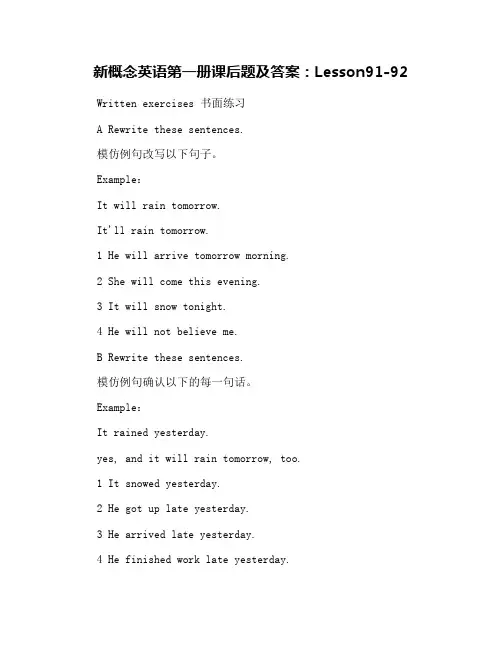
新概念英语第一册课后题及答案:Lesson91-92 Written exercises 书面练习A Rewrite these sentences.模仿例句改写以下句子。
Example:It will rain tomorrow.It'll rain tomorrow.1 He will arrive tomorrow morning.2 She will come this evening.3 It will snow tonight.4 He will not believe me.B Rewrite these sentences.模仿例句确认以下的每一句话。
Example:It rained yesterday.yes, and it will rain tomorrow, too.1 It snowed yesterday.2 He got up late yesterday.3 He arrived late yesterday.4 He finished work late yesterday.5 She drove to London yesterday.6 She telephoned him yesterday.7 He had a shave yesterday.8 She swept the floor yesterday.答案:Lesson 92A1 He'll arrive tomorrow morning.2 She'll come this evening.3 It'll snow tonight.4 He'll not believe me.B1 Yes, and it will snow tomorrow, too.2 Yes, and he will get up late tomorrow, too.3 Yes, and he will arrive late tomorrow, too.4 Yes, and he will finish work late tomorrow, too.5 Yes, and she will drive to London tomorrow, too.6 Yes, and she will telephone him tomorrow, too.7 Yes, and he will have a shave tomorrow, too.8 Yes, and she will sweep the floor tomorrow, too.。
新概念英语课堂笔记第一册 Lesson 91-92【讲解】people作“人们〞讲时为集体名词 ,本身即为复数。
作“人民〞讲时 ,也是集体名词 ,其前一般加the。
作“民族〞讲时是可数名词 ,有复数形式 ,也可与a连用。
people常用于指大批人或不精确说明人数的场合;而person一般用于指烧炼的人或精确说明人数的场合。
some people一些人;two persons两个人。
【例句】There are lot of people on the street. 那条街上人很多。
The government must depend on the people. 政府必须依靠人民。
There are 56 peoples in China. 中国有56个民族。
poor【用法】adj. 可怜的;贫穷的;差的【词组】the poor 穷人【例句】The wine was poor. 这葡萄酒很劣质。
I feel sorry for that poor child. 我为那个可怜的孩子感到难过。
My spoken English is poor. 我口语很差。
NamesCatherine /ˈkæθərin/ 奈杰尔〔男子名〕Jenney /ˈdʒeni/ 詹尼〔男子名〕Linda /'lɪndə/ 琳达【译文】他一直都是个好邻居。
【用法】○1本句是用现在完成时表达一般现在时的含义 ,如此处用一般现在时 ,那么语气就比拟平淡。
○2 neighbour是一个具体名词 ,用来表示邻居;而neighbourhood是一个抽象名词 ,用来表示邻里关系。
I think that they’ll move in the day after tomorrow.【译文】我想他们将在后天搬进来吧。
【用法】○1 I think 后面加了一个宾语从句 ,由that引导:that they’ll move in the day after tomorrow.○2 move in“搬进去〞 ,此处in为副词 ,因其后没有宾语。
Lesson 91 ~ 92 Poor Ian!◆ 词汇详解(1) still adv. 还,仍旧e.g. He is still here. 他还在这里。
(2) move v. 搬家,移动move to/into sp. 搬到某地e.g. We will move into a bigger house soon.我们马上要搬进一幢更大的房子。
常用搭配:move into !" move out of(3) miss v. 思念e.g. Will you miss me? 你会想我吗?词义扩展:miss还可解释为错过e.g. He overslept and missed the train. 他睡过头错过了火车。
(4) neighbour n. 邻居= neighbor (AmE)e.g. 一个好的邻居就像一个好朋友。
A good neighbour is like a good friend.词汇衍生:neighbourhood 街坊,四邻(5) person n. 人people n. 人们【学生版不出现】person人VS. people 人们person一般特指某个人,具有某种特指:He is a very nice person.people一般为person的复数,即more than one person(6) poor adj. 可怜的e.g. Poor kid, it’s a sad day for him. 可怜的孩子,这真是悲伤的一天。
词意扩展:poor还可以解释贫穷的,反义词为rich◆ 课文解析之经典例句(1) He has always been a good neighbour.#结构:现在完成时,强调他“一直以来”,变为一般现在时为:He is always a good neighbour.#注意always位置:用在助动词have/has后,过去分词前。
Lesson 91 and Lesson 92一用所给单词的适当形式填空(10分)1. Has Ian ______ (sell) his house yet?2. He is poor in ______ (play) football.3. Please give him my ______ (regard).4. I don’t want to miss ______ (see) that film on TV tonight.5. It will snow ______ (heavy) tomorrow.6. This is a quiet ______ (neighbour) with good shops.7. It’s my ______ (please).8. There were many ______ (person) at the race.9. The house is for ______ (sell).10. What he said is worth ______ (think) of.二用适当的词及所给单词的首字母填空使句意完整(10分)1. It is so wet. When did it r______?2. Ian hasn’t moved to his new house y______.3. They w______ move into this house the day after tomorrow.4. I arrived too late and m______ the train.5. He can’t m______ his legs in the small car.6. The weather has been p______ these days.7. Ian has always been a good person to his n______.8. You have to r______ for my feelings.9. Ian didn’t want to leave this house, but his w______ did.10. The house is old. It needs p______ again.三用所给动词的适当形式填空(10分)1. Tom ______ (have) a shave the day after tomorrow.2. I ______ not ______ (get) a letter from her since she left.3. I ______ not ______ (believe) it until I see with my eyes.4. ______ we ______ (go) to the park next weekend?5. I watched them sitting and ______ (talk) happily.6. Hurry up, or you ______ (be) late for school.7. ______ they ______ (come) back yet?8. She ______ (live) in the city for years.9. He ______ just ______ (leave) here.10. He looked for his pen this morning and he ______ (find) it.四用下列短语的适当形式填空(10分)1.Don’t stop. ______. Go on.2.He is not good in Chinese. He ______ it.3.There are many shops ______ the train station.4.Let’s ______ where to spend our holiday.5.Please ______ my ______ to Ian when you see him.6.I don’t want to ______ the film on TV tonight.7.Mr. Croft must wait for his turn because he didn’t ______ with the nurse.8.We have bought the house, but we can’t ______ until next month.9.We ______ him ______ our helper.10.They are busy ______ because they are leaving for holiday.五选择填空(15分)( ) 1. ______ Ian ______ his house yet?Yes, he ______ it last week.A.Did, sell; soldB.Has, sold; hasC.Has, sold; soldD.Has, sold; has sold( ) 2. The baby didn’t stop crying ______ his mother came back.A. untilB. afterC. whenD. because( ) 3. When ______ Ian ______ out? Tomorrow afternoon.A. did, moveB. has, movedC. does, moveD. will, move ( ) 4. Go down the street until you come to the end of it. Then you can see a white house.You can’t ______ it.A. findB. loseC. missD. watch( ) 5. Please give my ______ to Ian.A. regardB. a regardC. the regardD. regards( ) 6. I think they ______ in the day after tomorrow.A. moveB. movedC. will moveD. have moved( ) 7. Poor Ian didn’t want to leave, but his wife ______.A. willB. didC. hasD. is( ) 8. Where ______ we meet tomorrow everything?A. areB. wouldC. shallD. have( ) 9. We ______ not go there if it rains tomorrow.A. doB. shallC. areD. have( ) 10. Many clouds are coming. It ______ rain.A. willB. isC. is going toD. look like( ) 11. I’m sure there ______ a heavy rain this evening.A. will haveB. is goingC. will beD. is going to( ) 12. What ______ we do then? What about going out for a walk?A. doB. shallC. mustD. did( ) 13. How long ______ he ______ the book?A. has, borrowedB. has keptC. has lentD. is using( ) 14. They ______ basketball yesterday, and they ______ football this afternoon.A. play, playB. play, will playC. played, will playD. played, play( ) 15. Xiao Ming will come and play with me if he ______ busy.A. isB. won’t beC. isn’tD. will be六句型转换 (5分)1. They will drive home the day after tomorrow.(就划线部分提问)______ ______ they ______ home?2. Let’s paint this room.(变为疑问句)______ we ______ this room?3. Ian will move away tomorrow afternoon.(就划线部分提问)______ ______ Ian ______ tomorrow afternoon.4. The mechanics will repair my car this afternoon.(变为一般疑问句)______ the mechanics ______ your car his afternoon?5. She will sweep the floor tomorrow.(变为否定句)She ______ ______ the floor tomorrow.七补全对话(10分)A: Look at the ___1___. It’s very heavy!B: Anna, you ___2___ climb the mountain today, I’m ___3___. What ___4___ you do? A: I ___5___ I’ll stay at home and ___6___ some reading.B: Good. It’s better ___7___ do some reading on ___8___ days.A: Ok, I ___9___ go out today. I’ll read some books ___10___ history.1. ______2. ______3. ______4. ______5. ______6. ______7. ______8. ______9. ______ 10. ______八完形填空(10分)Mike Smith is a six-year-old boy. His father has a shop in the center of a small town. He ___1___ some food in his shop. He’s friendly to the buyers and the food in his shop is ___2___. So people like to buy something there and he’s very ___3___ all the time.It was Mr. Smith’s forty-first birthday yesterday. His wife decided to ___4___ some fish for her husband. As she couldn’t leave his shop and she had to ___5___ in the kitchen. She thought her son could help her. So she told Mike to go to ___6___ some fish. Before the boy went out, she said, “Your dad likes fish alive (活的) , you know. Don’t ___7___ the dead fish home.”“B ut how can I tell the living fish from the dead fish?”“That’s easy, my son,” said the woman. “Put the fish into the water and watch carefully. The living fish can ___8___, but the dead can’t.”“Ok, mum,”the boy said and left. He went outside the town and saw ___9___ famers catching fish in a pool. He put a fish into the pool. And the fish soon went under the water. He was ___10___ and shouted, “Please sell the fish to me, sir!”( ) 1. A. shows B. makes C. does D. sells( ) 2. A. cheap B. expensive C. free D. dirty( ) 3. A. tired B. thirsty C. busy D. hungry( ) 4. A. kill B. fry C. catch D. give( ) 5. A. cook B. rest C. sleep D. play( ) 6. A. borrow B. lend C. buy D. look for( ) 7. A. take B. bring C. drop D. pull( ) 8. A. fly B. walk C. run D. swim( ) 9. A. few B. a few C. little D. a little( ) 10. A. happy B. sad C. strange D. sorry九阅读理解(10分)ATom and Fred are students. They are both twelve years old, and they are in the same class in their school.Last Friday they had a fight in class. Their teacher was very angry. He said to both of them, “Stay here after the lesson this afternoon and write your names one hundred times.”After the last lesson, all the other students went home. But Tom and Fred stayed in their classroom with their teacher. They began to write their names. Then Fred began to cry. The teacher looked at him and said, “Why are you crying, Fred?”“Because his name is Tom May and my name is very long. My name is Frederich Hollingsworth.” Fred said.根据短文内容判断句子正(T)误(F)。
新概念一Lesson91~L92 课内语法新课内容:一、单词:拼读、过关、讲解1.still ad.①还,仍旧:He's still here.他仍在这里。
(▲still表示仍在继续或仍未发生,位于所表示的情况之前,因此也可在助动词和否定词之前)②([同]even)[修饰比较级]还要,更③尽管如此,可还是:It's rainning,(but)still I'd like to go.天在下雨,可我还是想去。
2.move vt.①移动,搬动,使改变位置(或姿势):move house 搬家vi.①移动;离开;动身;前进;(下棋)走一子:Don't move, or I'll shoot.不许动,否则就开枪了②迁移;搬家move to…搬到…eg: Has he moved to his new house yet? 他已经搬进新居了吗?3.miss vt.①未找到;未遇到;未看到:miss one's way 迷路②想念;怀念;惦记:I'll miss him.我会想念他的。
③发觉……丢失:I missed my wallet.我发觉皮夹子丢了。
4.neighbour 邻居eg: He has always been a good neighbour.他一直是个好邻居。
5.person n.人;人物eg: He's a very nice person.他是个非常好的人。
people的单复数The Chinese people are hardworking and brave.▲泛指“人民”,“人们”时,是单数形式,复数概念;作主语时,与复数动词连用。
▲指“民族”、“(一个国家的)人民”时,可以有单数和复数形式两种6.poor①穷的、贫困的:a poor nation 穷国②虚弱的;不足的;笨拙的;③可怜的,不幸的:Poor Ian! 可怜的伊恩!二、词组1、错过做某事miss doing sth2、上周last week3、打算做某事be going to do4、搬进---move into5、后天the day after tomorrow6、请代我向他问好please give him my regards7、tomorrow morning 明天早上8、But his wife did. 但他的妻子要离开。
省略动词部分只留下相对应的情态动词、be动词、助动词三、语法:一般将来时⑴一般将来时表示将来某一时刻的动作、状态以及打算。
该时态一般与表示将来意义的时间状语连用,如tomorrow(明天),this month(本月),the day after tomorrow(后天),next week(下周),in two days' time(两天之后),from now on(从现在起),in the future (将来)等。
⑵一般将来时的形式为will/shall+动词原形will可用于所有人称,但shall仅表示单纯将来时用于第一人称I和we,作为will的一种替代形式。
否定缩写:shan't = shall not, won't = will not:I shan't leave tonight. I'll leave tomorrow. 今天夜里我不走。
我将于明天离开。
They won't go to London this weekend. 这个周末他们不去伦敦。
此外,will除了表示纯粹的将来时间外,还表示说话人的意图和意愿,而shall除了表示将来时间外同时不表示说话人的责任或决心。
⑶除了will/shall外,还可以用其他方法表示将来。
在口语中,be going to比will/shall要为普通,用来表示说话人的意图或打算。
如:She is going to travel by air. 她打算乘飞机旅行。
也可用来表示有迹象某事即将发生。
如:It's going to rain. 将要下雨了。
⑷可与将来时连用的时间短语有:今天:this morning/afternoon/evening 今天上午/下午/晚上tonight今夜明天:tomorrow morning/afternoon/evening明天上午/下午/晚上后天:the day after tomorrow后天the night after next后天夜里其他:in the morning在上午in the afternoon在下午in the evening在晚上课内考核一、单词连线move 邻居neighbour 仍然people 搬家poor 人miss 人们still 贫穷的person 想念二、单选1.She _______ to give me the present, does she?A.wantsB.wantedC.doesn't wantD.won't want2.When will you ________ the book I lent you ?A.returnB.turnC.repayD.interrupt3.We _______to Paris to spend our holiday next year.A.goB.will goC.goneD.went4.I _________my jobs in two days.A.finishB.finishedC.will finishD.finishing5.They _______a car next month.A.buyB.will buyC.boughtD.buying新概念一L91~L92课前测试一、单词:1、还,仍旧2、搬家3、思念4、邻居5、人6、人们7、可怜的8、家务(L55)二、词组:1、搬到某处2、明天上午3、代我向他问好4、后天5、后天晚上6、上周三、用所给动词的正确形式填空1.What will he_____________(do) tomorrow morning?2.We haven't______________(have) lunch now.3.When did he______________(telephone) me yesterday?4.Is your brother____________(write) a letter?5.Don't__________(close) the window.6.He can_____________(go) with me.7.I will______________(leave) here tomorrow.8.They are going___________(move) to London next year.9.She doesn't_____________(like) English at all.10.Have you________________(finish) your homework?四、单项选择1.We_______________miss you very much.A.all, willB.will, allC.will, everyD.every, will2.We'll go to Shanghai the day_____________tomorrow.A.afterB.beforeC.inD.behind3.Have you____________your house yet?A.sellingB.soldC.sellD.selled4.When will the new people move______________this house?A.intoB.ontoC.forD.on5.When did you do it ? I__________________it a moment ago.A.have doneB.am doingC.doneD.did6.He has_________________the window already.A.shutsB.shutC.to shutD.shuting7.Will you see Tom today?____________________.A.Yes, I willB.Yes, I amC.Yes, I will notD.No, I will8.Please give my regards____________________him.A.forB.inC.atD.to9.Has he had his dinner yet ?___________________.A.Yes, he hasn'tB.No, he hasn'tC.Yes, he hadD.No, he didn't10.He drove_______________Tian Jing the day before yesterday.A.inB.onC.toD.at五、翻译:1、你今天能见到伊恩吗?2、他一直是个好邻居。
3、这台自行车多少钱?4、他打算搬到新房去。
5、你已经迁进新居了吗?6、傍晚,孩子们放学回家(L55)。